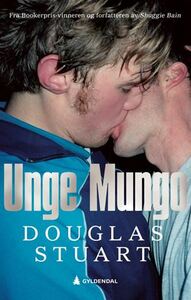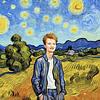Take a photo of a barcode or cover
The best thing I can say about Young Mungo (other than its incredible Picador cover) is that it's immersive. Douglas Stuart places you deep into the city of Glasgow and the mysterious meadows of the North and, as the story goes along, deeper into the city of his character's hearts and souls.
Other than that, Young Mungo is depressing and unrewarding. It would scoop your insides off with its unapologetic displays of common-day violence and abuse and leave you feeling raw and empty. I'm not putting it against Stuart and the book for as demented as it sounds, I enjoy that kind of read. It's cathartic. But I would enjoy it best if it's well-written. While there were some brilliant passages here and there, the visceral beauty of his characters wasn't present in the mostly unmemorable prose.
However, perhaps unrewarding is the wrong term to call Young Mungo for the queer affair between Mungo and James was as rewarding as a whistle of wind in a scorching afternoon. It was the heart of the story, obviously, but it came too late and it went too quick. The first half of the book seemed like Stuart trying to readapt the story of his Booker-prize winning Shuggie Bain, with a similar story one could clearly see. The queer love story, boasted in the Picador cover and the official plot on the inside-jacket of the book only started at the second half and was finished almost immediately when it started.
Such a shame, too, because Mungo and James's story was so poignant and so beautifully done. Their own personal struggle with their sexualities, differently handled, but still together, was one of the most heartbreaking things I've read recently. One can say that their brief affair is a direct allusion to the fleetingness of that special kind of love in a city that wouldn't let it foster. But it still felt too brief for me, as brief as the almost brushed-over, unless it became relevant to the story and only until it is relevant to the conflict, sectarianism of Catholics and Protestants in Glasgow.
Despite its universal themes, Young Mungo still felt like a specific read, as if it's written for a certain group of people—The Booker Prize committee, maybe, I don't know. I'm certainly not one of those people, hence, this review.
Other than that, Young Mungo is depressing and unrewarding. It would scoop your insides off with its unapologetic displays of common-day violence and abuse and leave you feeling raw and empty. I'm not putting it against Stuart and the book for as demented as it sounds, I enjoy that kind of read. It's cathartic. But I would enjoy it best if it's well-written. While there were some brilliant passages here and there, the visceral beauty of his characters wasn't present in the mostly unmemorable prose.
However, perhaps unrewarding is the wrong term to call Young Mungo for the queer affair between Mungo and James was as rewarding as a whistle of wind in a scorching afternoon. It was the heart of the story, obviously, but it came too late and it went too quick. The first half of the book seemed like Stuart trying to readapt the story of his Booker-prize winning Shuggie Bain, with a similar story one could clearly see. The queer love story, boasted in the Picador cover and the official plot on the inside-jacket of the book only started at the second half and was finished almost immediately when it started.
Such a shame, too, because Mungo and James's story was so poignant and so beautifully done. Their own personal struggle with their sexualities, differently handled, but still together, was one of the most heartbreaking things I've read recently. One can say that their brief affair is a direct allusion to the fleetingness of that special kind of love in a city that wouldn't let it foster. But it still felt too brief for me, as brief as the almost brushed-over, unless it became relevant to the story and only until it is relevant to the conflict, sectarianism of Catholics and Protestants in Glasgow.
Despite its universal themes, Young Mungo still felt like a specific read, as if it's written for a certain group of people—The Booker Prize committee, maybe, I don't know. I'm certainly not one of those people, hence, this review.
challenging
sad
slow-paced
This book was EXTREMELY well written, but my goodness, it was absolutely heart wrenching. All I knew going into this read was that it was a queer love story, but I did not look at any of the content warnings. The SA scenes were really difficult to stomach. I guess at least it ended on a *singular* sentence of hope???
dark
emotional
sad
medium-paced
Plot or Character Driven:
Character
Strong character development:
Yes
TW: rape, csa, homophobia, violence
I get why this novel would be hitting with the reader base of "A Little Life" in particular. Personally, not my type of novel - it feels a little too Oscar-bait-y but in a book form. However, what really helps elevate it is the setting and the specifics of its socio-political context.
I get why this novel would be hitting with the reader base of "A Little Life" in particular. Personally, not my type of novel - it feels a little too Oscar-bait-y but in a book form. However, what really helps elevate it is the setting and the specifics of its socio-political context.
dark
emotional
sad
tense
slow-paced
Plot or Character Driven:
Character
Strong character development:
Yes
Loveable characters:
Complicated
Diverse cast of characters:
Yes
Flaws of characters a main focus:
Yes
The beautiful writing is not worth all the unnecessary suffering Mungo is put through. There is about 2 seconds of happiness in the whole book, I was miserable through most of it.
As I saw in a few other reviews, I also found this very similar to “a little life”, in the sense that both books tackle life’s sufferings, pains, troubled relationships and violence. However, unlike “a little life” I felt a lack of contrast in its description of Mungo’s journey. The amount of “bad” without happy moments to counterbalance the book made it much harder to read.
As I saw in a few other reviews, I also found this very similar to “a little life”, in the sense that both books tackle life’s sufferings, pains, troubled relationships and violence. However, unlike “a little life” I felt a lack of contrast in its description of Mungo’s journey. The amount of “bad” without happy moments to counterbalance the book made it much harder to read.
challenging
emotional
sad
tense
slow-paced
Plot or Character Driven:
A mix
Strong character development:
No
Loveable characters:
Complicated
Diverse cast of characters:
Yes
Flaws of characters a main focus:
Yes





